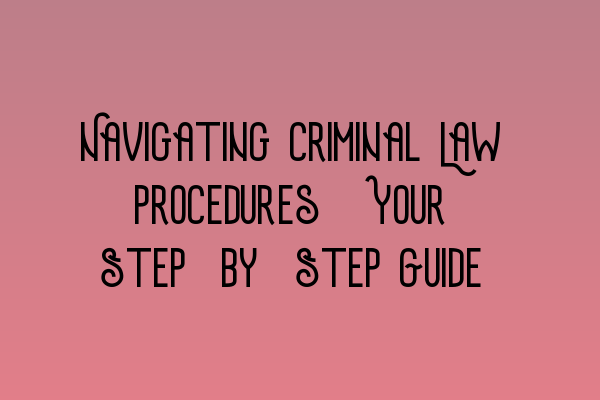Navigating Criminal Law Procedures: Your Step-by-Step Guide
Welcome to SQE Criminal Law & Practice Law UK, where we aim to provide comprehensive assistance and support to aspiring solicitors in mastering the intricacies of criminal law. In this blog post, we will guide you through the step-by-step process involved in navigating criminal law procedures. Whether you are a law student, trainee solicitor, or someone interested in gaining a deeper understanding of criminal law, this guide is here to help you.
Step 1: Understanding Criminal Law Basics
Before diving into criminal law procedures, it is essential to have a solid foundation of the basic principles and concepts. Familiarize yourself with key terms, elements of criminal offenses, and the distinction between substantive and procedural laws.
If you need to brush up on criminal law fundamentals, check out our article on SQE 1 Preparation Courses where you can find comprehensive resources and expert guidance.
Step 2: Initiating Criminal Proceedings
The second step is to understand how criminal proceedings are initiated. This usually involves the filing of a complaint, arrest, and subsequent investigation. Learn about the role of the police, their powers of investigation, and the importance of gathering evidence.
For further insights, our article on SQE 2 Preparation Courses will provide you with valuable information on how to tackle criminal law procedures effectively.
Step 3: Pre-trial Procedures
Once the investigation is complete, the pre-trial procedures come into play. This phase includes formal charging, bail hearings, and case preparation. Familiarize yourself with the process of gathering and presenting evidence, and the importance of legal representation.
To enhance your understanding of pre-trial procedures, we recommend checking out our related articles on SQE 1 Practice Exam Questions and SQE 1 Practice Mocks FLK1 FLK2, where you can access invaluable practice resources.
Step 4: The Trial Process
The trial process is the culmination of criminal law procedures. It involves presenting the case before a court, both by the prosecution and the defense. Gain an understanding of the rules of evidence, examination and cross-examination of witnesses, and the standard of proof.
If you want to stay updated on the latest SRA SQE Exam Dates, make sure to bookmark our article on SRA SQE Exam Dates, which provides comprehensive information on examination schedules.
Step 5: Post-Trial Procedures
The final step involves post-trial procedures such as sentencing, appeals, and potential remedies. Gain insights into the different sentencing options, factors considered by the court, and the appellate process.
For in-depth guidance on post-trial procedures, our team at SQE Criminal Law & Practice Law UK is always here to help. Feel free to reach out to us or enroll in our advanced courses to enhance your knowledge and expertise.
Thank you for reading our step-by-step guide on navigating criminal law procedures. We hope this article has provided you with valuable insights and resources to excel in this dynamic field. Stay tuned for more informative articles from SQE Criminal Law & Practice Law UK!
